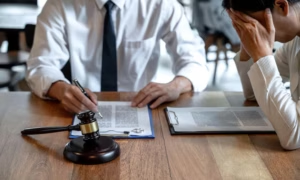Experiencing a personal injury can be a traumatic and life-altering event. In addition to the physical pain and emotional distress, there are often financial burdens, medical expenses, and legal complexities to navigate. Seeking legal representation in personal injury cases is crucial to protect your rights, seek compensation for your losses, and facilitate the healing process. In this article, we will explore the journey from hurt to healing and discuss how to navigate the legal landscape of personal injury. We will delve into the importance of legal representation, the steps involved in a personal injury case, and the factors that influence the outcome.
The Importance of Legal Representation in Personal Injury Cases
When it comes to personal injury cases, having legal representation is essential. Here are several key reasons why hiring a personal injury lawyer is crucial:
-
Knowledge of Personal Injury Laws:
Personal injury lawyers specialize in this area of law and have a deep understanding of the legal principles, statutes, and regulations that apply to personal injury cases. They stay updated with the latest developments in personal injury law, ensuring that they can provide the best representation and advice to their clients.
-
Investigation and Evidence Collection:
Personal injury lawyers conduct thorough investigations to gather evidence and build a strong case. They review accident reports, gather witness statements, obtain medical records, and consult with experts when necessary. This evidence is crucial in establishing liability and proving the damages suffered by the victim.
-
Legal Strategy and Negotiation:
Personal injury lawyers develop a legal strategy tailored to the specifics of each case. They assess the value of the claim, negotiate with insurance companies, and pursue fair compensation for their clients. Their negotiation skills and understanding of the legal landscape help ensure that their client’s rights are protected and that they receive the compensation they deserve.
-
Litigation and Trial Experience:
While many personal injury cases are resolved through settlements, some may proceed to trial. In such instances, personal injury lawyers are prepared to represent their clients in court. Their experience and knowledge of courtroom procedures and litigation tactics enable them to present a compelling case and advocate for their clients effectively.
The Steps Involved in a Personal Injury Case
Navigating the legal landscape of a personal injury case involves several important steps. Here is an overview of the typical progression of a personal injury case:
-
Consultation and Case Evaluation:
The first step is to consult with a personal injury lawyer. During this initial meeting, the lawyer will evaluate the merits of the case, review relevant documents and evidence, and provide an assessment of the potential legal options. This consultation helps the lawyer determine the viability of the case and advise the client on the best course of action.
-
Investigation and Evidence Collection:
After taking on the case, the personal injury lawyer will conduct a comprehensive investigation. This includes gathering evidence, reviewing medical records, obtaining accident reports, and consulting with experts when necessary. The goal is to gather all relevant information that supports the client’s claim and establishes liability.
-
Medical Evaluation and Treatment:
Seeking medical evaluation and treatment is crucial for both the well-being of the injured party and the strength of the case. Personal injury lawyers often work closely with medical professionals to ensure their clients receive appropriate medical care and documentation of their injuries. This medical evidence is vital in proving the damages suffered.
-
Negotiation and Settlement:
In many personal injury cases, a settlement is reached through negotiation with the at-fault party’s insurance company. Personal injury lawyers represent their clients in these negotiations, advocating for fair compensation for medical expenses, lost wages, pain and suffering, and other damages. They aim to reach a settlement that adequately addresses their client’s needs.
Factors That Influence the Outcome of Personal Injury Cases
Several factors can influence the outcome of a personal injury case. Understanding these factors is crucial for the injured party and their legal representation. Here are some important considerations:
-
Liability:
Establishing liability is a critical factor in personal injury cases. Personal injury lawyers gather evidence to demonstrate that the at-fault party acted negligently or intentionally, resulting in the injuries suffered by the victim. The strength of the evidence and the ability to prove negligence significantly impact the outcome of the case.
-
Damages:
The extent of the damages suffered by the injured party also plays a crucial role. Personal injury lawyers seek compensation for medical expenses, lost wages, pain and suffering, emotional distress, and other damages. The severity of the injuries, the impact on the victim’s life, and the long-term consequences all affect the value of the claim.
-
Insurance Coverage:
The insurance coverage of the at-fault party and the injured party’s insurance policies can impact the outcome. The limits of the insurance policies, as well as any exclusions or limitations, may influence the amount of compensation that can be obtained.
-
Comparative Negligence:
Some jurisdictions follow the principle of comparative negligence, where the injured party’s negligence may affect the amount of compensation they can recover. Personal injury lawyers work to establish the extent of the defendant’s liability and minimize any potential impact of comparative negligence on the case.
Navigating the legal landscape of personal injury cases is crucial to protect your rights, seek fair compensation, and facilitate the healing process. Hiring a personal injury lawyer in Columbus provides the necessary expertise, knowledge, and guidance to navigate the complexities of the legal system. Understanding the importance of legal representation, the steps involved in a personal injury case, and the factors that influence the outcome empower individuals to pursue their claims effectively. By seeking legal representation and following the appropriate legal process, individuals can move from hurt to healing, receiving the compensation they deserve and focusing on their recovery and well-being.



































